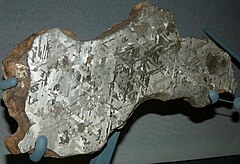Canyon Diablo (meteorite)
| Canyon Diablo | |
|---|---|

Canyon Diablo iron meteorite fragment (IAB) 2,641 grams. Note colorful natural desert patina.
|
|
| Type | Iron |
| Structural classification | Coarse Octahedrite |
| Group | IAB-MG |
| Composition | 7.1% Ni; 0.46% Co; 0.26% P; 1% C; 1% S; 80ppm Ga; 320ppm Ge; 1,9ppm Ir |
| Country | United States |
| Region | Coconino County, Arizona |
| Coordinates | 35°03′N 111°02′W / 35.050°N 111.033°WCoordinates: 35°03′N 111°02′W / 35.050°N 111.033°W |
| Observed fall | No |
| Fall date | 49000 years ago |
| Found date | 1891 |
| TKW | 30 tonnes |
| Strewn field | Yes |
 etched slice |
|
The Canyon Diablo meteorites include the many fragments of the asteroid that created the Barringer Crater (Meteor Crater), Arizona, United States. Meteorites have been found around the crater rim, and are named for nearby Canyon Diablo, which lies about three to four miles west of the crater.
The asteroid fell about 50,000 years ago. The meteorites have been known and collected since the mid-19th century and were known and used by pre-historic Native Americans. The Barringer Crater, from the late 19th to the mid-20th century, was the center of a long dispute over the origin of craters that showed little evidence of volcanism. That debate was settled in the 1950s thanks to Eugene Shoemaker's study of the crater.
In 1953, Clair Cameron Patterson measured ratios of the lead isotopes in samples of the meteorite. The result permitted a refinement of the estimate of the age of the Earth to 4.550 billion years (± 70 million years).
This meteorite is an iron octahedrite. Minerals reported from the meteorite include:
Samples may contain troilite-graphite nodules with metal veins and small diamonds.
The biggest fragment ever found is the Holsinger Meteorite, weighing 639 kilograms (1,409 lb), now on display in the Meteor Crater Visitor Center on the rim of the crater. Other famous fragments:
...
Wikipedia
